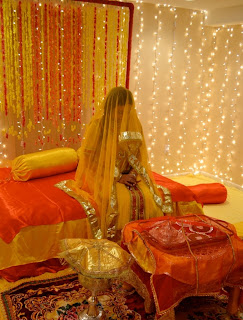Full wedding ceremony in
Pakistan
Pakistan is an
Islamic country that is located in South Asia, and most of the Pakistan
weddings follow Islamic tradition. The main aim of the wedding function is to
bring the bride, groom and their families closer, and there are many
pre-wedding customs that have to be observed before the actual wedding. Some of
the common customs found in Pakistan wedding are Mangni, obtan, Dholki, Mayoon, Rasm-e-Henna, Nikkah, Barat, Rukhsati, walima and chothi
Mangni:
Mangni is a promise
by which both the parties agree to enter into a marriage in future. It is the
very first thing in any wedding in which bride and groom wear the rings.
Mayoon:
It is called Mayoon or Mayun or
Ubtan. This is a pre-wedding custom.
Bride is supposed to stay indoors, away from the public's view especially from
guys. The bride and groom are not allowed to see each other after the Mayoon.
The main purpose of this occasion is that the bride stops doing any housework and start beautifying herself for the wedding. The Mayoon is usually celebrated at the bride’s house and is attended by her close friends and family. The groom's mother brings ubtan (turmeric) for the bride which is applied to the bride's skin each day leading up to the wedding to brighten the complexion. The actual party is for ladies only where they can sing and dance while the married females apply ubtan (turmeric), do the oiling and tease the bride.
The main purpose of this occasion is that the bride stops doing any housework and start beautifying herself for the wedding. The Mayoon is usually celebrated at the bride’s house and is attended by her close friends and family. The groom's mother brings ubtan (turmeric) for the bride which is applied to the bride's skin each day leading up to the wedding to brighten the complexion. The actual party is for ladies only where they can sing and dance while the married females apply ubtan (turmeric), do the oiling and tease the bride.
Generally the bride's family gives bangles and sometimes clothes
to her friends, depending on what the family can afford. The bride usually
wears a simple yellow shalwar kameez and must remain in
yellow clothing until the Mehindi day.
Similar ceremony is held for the groom, where bride's mother, sisters, cousins and friends bring “ubtan” for groom and rub it on his skin.
Yellow is traditional for mayoon because it shows the least staining as the bride was being pampered with ubtan and oils, etc. The idea is to glow in your bridal red after so many days in yellow and out of sunshine.
Similar ceremony is held for the groom, where bride's mother, sisters, cousins and friends bring “ubtan” for groom and rub it on his skin.
Yellow is traditional for mayoon because it shows the least staining as the bride was being pampered with ubtan and oils, etc. The idea is to glow in your bridal red after so many days in yellow and out of sunshine.
.
This is the traditional mayoon ceremony. Nowadays, both mehndi
(henna night) and mayoon can be merged in one occasion.
Mehindi:
Mehindi is
performed on the second day of marriage. During Mehindi the relatives of bride
gather at her home and apply traditional Henna on her hand and feet. Only the
female members of the families join the function. The bride wears yellow
customs and she is not allowed to put on any makeup.
All girls wear
colorful dresses which make the ceremony more beautiful and colorful.
Nikkah:
Nikkah happens as
the Nikkah naama, which is the
document of marriage is registered. There are many terms and conditions
mentioned in the Nikkah naama and
they include the rights of the women to divorce and the monetary amount that
will be given to the bride by the groom Wallis are witness must be present
during Nikkah and the father of the bride and groom act as Wallis. Certain Urdu
verses are read by the priest and the bride accept the terms and conditions of
the Nikkah naama in front of the relatives by saying “Qabool hay” and the wedding will be announced.
After mehindi next function is Barat. A Baraat is a bridegroom’s wedding procession in Pakistan. It is customary for the bridegroom to travel to the wedding venue (often the bride’s house) on a mare or horse, accompanied by his family members. The baraat can become a large procession, with its own band, dancers, and budget. The groom and his horse are covered in finery and do not usually take part in the dancing and singing; that is left to the “baraatis” of the procession. Traditionally, baraatis are attended to as guests of the bride’s family. The bride wears a beautiful dress like custom called “bridal lehanga” for the barat and common jewelry in which teekah, jhumar or mathapati, pair of ear rings, and necklace are included
Walima:
Walima is a
function that is attended by the families and friends of bride and groom as
well as the community and friends. It is on the next day of barrat in the
morning. It is organized by the groom’s parents. Food is very important part of
any Pakistani wedding, it comes in many varieties of dishes like baryani, meat,
beef, vegetables salads, sweets, and cold drinks etc. betel and pan are also
offered in some Pakistani weddings.
The drum (dholki)
is the main percussion instrument that is played trough out much of the wedding
ceremony
Marriage is considered a social contract between
the bride and groom. Both the bride and groom are asked to give their consent
to marriage before Nikkah and the have to share duties and responsibilities
after their marriage. Pakistani marriage based on Islamic principles

.jpg)




















“This topic couldn’t have come at a better time. I was just dealing with something similar.”
ReplyDeleteAqeeqa Box